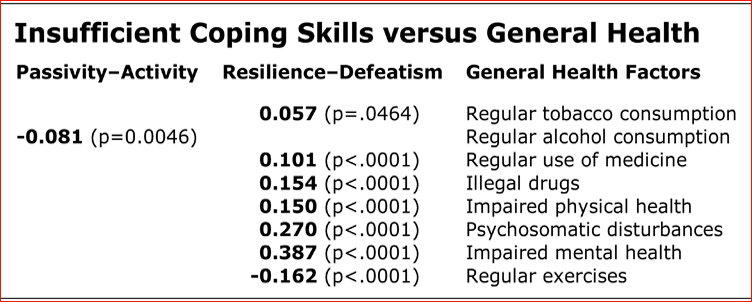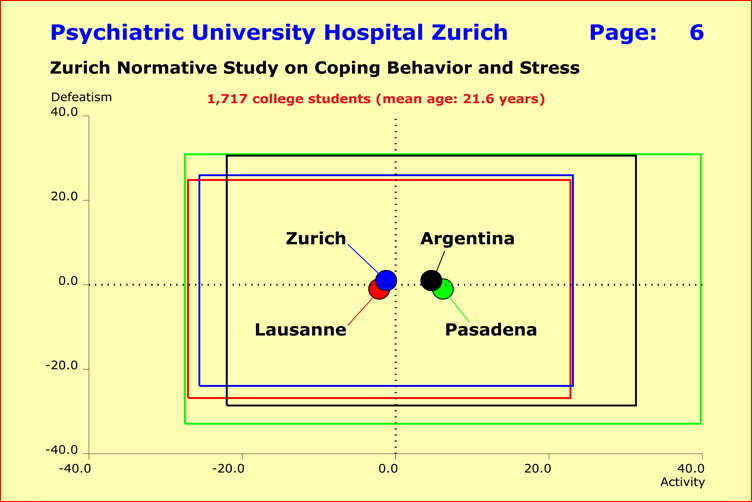OPTIMI: Early Detection & PreventionInstitute for Response-Genetics, University of ZurichHead: Prof. Dr. Hans H. Stassen |

|


Partners:
|
Coping Skills: Socio-Culturally Independent Personality TraitsTo determine the number of reproducible dimensions inherent in the COPE instrument, our structural analysis based on Neural Nets (NNs) used the Pasadena (n=407) and Lausanne (n=404) students for iterative learning, while the Zurich data (n=406) served as independent verification samples. We found 2 independent, highly stable and reproducible scales (factors) that explained the observed inter-individual variation in coping behavior sufficiently well (68.6%). These COPE scales included 17 and 11 items respectively and reflected basic coping behavior in terms of "activity" (activity-passivity) and "defeatism" (defeatism-resilience). In a second step, the newly contructed scales were validated by student samples from Milano (Italy: n=419), Castellon (Spain: n=400), Cipoletti (Argentina: n=484), and Hangzhou (China: n=461). Activity versus DefeatismActivity is best described through items like "turning to work", "getting help and advice from other people", or "coming up with a strategy" whereas "defeatism" is characterized by behavior like "giving up", "using alcohol", or "refusing to believe that this has happened". "Passivity" is understood as negative scoring on the activity scale and "resilience" as negative scoring on the defeatism scale. The term "resilience" is used here as a broader concept, encompassing all those endogenous mechanisms that support and maintain health, thereby enabling subjects to cope with stressful situations. This particularly includes personality traits supporting or impeding social skills. External ValidationOur results suggest that the newly developed "defeatism-resilience" scale represents a highly stable, socio-culturally independent personality trait, while the "activity-passivity" scale appears to assess a small, socio-culturally influenced component as well. The factors "alcohol consumption", "regular use of medicine", "illegal drugs", "impaired physical health", "psychosomatic disturbances", "impaired mental health", and "regular exercises", as quantitatively assessed through the ZHQ, were used to externally validate the newly constructed scales. Correlation analyses yielded a highly significant and consistent picture of the close relationship between insufficient coping skills on the one hand, and the state of general health on the other (Table): 
References
Delfino JP, Barragán E, Botella C, Braun S, Bridler R, Camussi E, Chafrat V, Lott P, Mohr C,
Moragrega I, Papagno C, Sanchez S, Seifritz E, Soler C, Stassen HH: Quantifying Insufficient
Coping Behavior under Chronic Stress. A cross-cultural study of 1,303 students from Italy,
Spain, and Argentina. Psychopathology 2015; 48: 230-239
Mohr C, Braun S, Bridler R, Chmetz F, Delfino JP, Kluckner VJ, Lott P, Schrag Y, Seifritz E,
Stassen HH: Insufficient Coping Behavior under Chronic Stress and Vulnerability to Psychiatric
Disorders. Psychopathology 2014; 47: 235-243
Stassen HH, Delfino JP, Kluckner VJ, Lott P, Mohr C: Vulnerabilität und psychische Erkrankung. Swiss Archives
of Neurology and Psychiatry 2014; 165(5): 152-157
|
|

Mean scores and variation of scales "activity" (x-axis) versus "defeatism" (y-axis) as derived from the COPE data of 407 students from Pasadena (green), 404 students from Lausanne (red), and 406 students from Zurich (blue) after orthogonalization and normalization. There are no between-center differences with respect to "defeatism" (zero on the y-axis), whereas active Pasadena students achieved, on average, higher activity scores compared to Zurich and Lausanne. Data from a sample of 500 students from Argentina were used for verification and underlined the socio-cultural independence of the coping behavior scales. |
|
| [ Mail to Webmaster ] k454910@ifrg.ch |